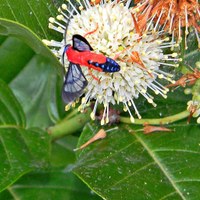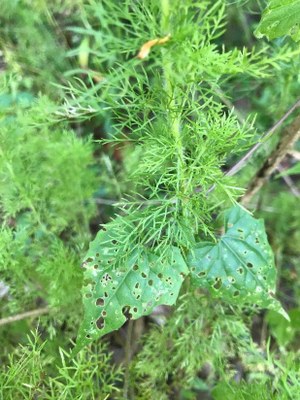Never Truly Isolated
June 2020
By Ranger Amy
During this time of isolation and disconnect, I am reminded of our primal connection to something greater: our life-giving earth. Everything in the natural world means something to another living being.
The weedy plant dogfennel sent me down a rabbit-hole of amazing interconnections. This poisonous plant is native to East Texas and the eastern United States.
Colorful moth

- Scarlet-bodied wasp moth. Photo by Bob Peterson
Dogfennel is important to a moth called the scarlet-bodied wasp moth. This moth resembles a wasp with its bright red body, and it’s found from South Carolina to Texas, specifically the coastal regions.
The host plant that the moth’s larvae need for food is hempvine.
Enter dogfennel
The dogfennel comes into the story after the larvae mature into moths and start looking for a mate. The male moth dissolves the toxins in the dogfennel by throwing up on it.
Then he gathers the liquid toxins from the plant into pouches on his underside. These toxins protect him from bats and spiders. He will then share this protection with his mate by spreading the toxins on top of her and their eggs.
(Students studying this moth have placed them in the webs of golden orb weaver spiders. The spiders do not eat them. Instead, they cut the moth free from their webs!)
On a nature hunt

- Hempvine growing on dogfennel
After reading about this moth, I went on my citizen science iNaturalist app to see if it’s been found in the area. Some have been found parallel to us in Louisiana, but we haven’t reported any here in Jasper or Tyler county.
I went to a location in the park where I know hempvine grows and searched for caterpillars. I didn’t find any, but growing next to the vine was a large patch of dogfennel.
Connections
This small moth reminded me that all the strings in nature tug on one another. We are never truly isolated.
“When we try to pick out anything by itself we find that it is bound fast by a thousand invisible cords that cannot be broken, to everything else in the universe.” ~John Muir
